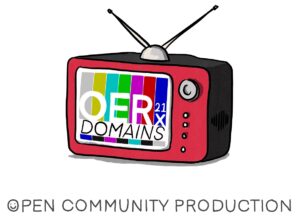Introduction
This is a reflective blog post written by Greg Walters from the University of Glasgow. It discusses the Open Space session that was delivered by Copyright and Online Learning Special Interest Group (ALT CoOLSIG) members, Lorna M. Campbell, Chris Morrison, Jane Secker & Greg Walters, on the 21st of April, during the ALT OERx Domain 2021 conference. Greg writes…..
The Open Space session aimed to encourage discussion around four key questions relating to exploring the relationship between open practices, copyright literacy and the shift to online teaching. Each of the four facilitators led the discussion on one of the key questions. Prior to the session commencing, participants were encouraged to engage with a Padlet that contains links to online resources aligned to the four questions. Discord (group chatting platform), was the technology utilised by ALT to facilitate the discussion amongst the presenters and participants.
Establishing definitions
During the opening moments of the Open Session, Chris and Jane discussed their definition of Copyright Literacy. Jane also presented a definition of Open Educational Practice found in George Veletsianos and Royce Kimmons’s, ‘Assumptions and Challenges of Open Scholarship (2012)’, to illustrate the broadness of Open Educational Practices. Exploring both definitions helped establish the topic and focus the discussion going forward.
Discussion of key questions led by ALT CoOLSIG members
I started the discussion with the question “Is copyright law a barrier or enabler of open practice?”. I identified both lack of lack of training and knowledge around copyright Law as possible barriers in relation to open practice. The group discussed these barriers further with Chris leading a discussion on whether copyright was accessible as a discipline. The group suggested that a layer of translation is needed to interpret copyright’s complex nature and inaccessible legal language. However, Chris noted that vagueness and uncertainty are integral aspects of working with copyright and that accessibility did not mean it was always possible to get absolutely clarity.
This led to a discussion on whether copyright literacy acts as a barrier or enabler to open practice? The discussion (led by Jane) around this question briefly discussed what a literacy is and emphasised the importance of interpreting copyright law it and applying it in your own practice. We also discussed being able to assess risk as well and raising levels of copyright literacy amongst the community as this will enable us to better support open practice.
Lorna then led a discussion on whether open practice focuses too much on copyright and licensing, instead of other areas of openness. Lorna opened the conversation by highlighting that this can be something of a polarising issue. Some have suggested that focusing too much on copyright and licensing risks missing the affordances of Open Educational Practices (OEP). The discussion progressed to explore differing perspectives in the context of copyright as a discipline; if the CoOLSIG focuses primarily on discussing the mechanics of licensing, would the group potentially distance itself from supporting practice? Ultimately, the group wants to utilise copyright literacy to facilitate and change practice, especially in response to the pivot to online learning over the past year which has generated considerable uncertainty in the application of copyright law.
Copyright literacy was one of the key themes in the Open Session and the conversation explored the similarities between copyright literacy and open practice and the debate around whether it underpins open practice? It was further touched on when a participant discussed the challenges they were experiencing in encouraging staff to engage with learning about copyright. This led to discussion of the playful learning approach that Jane and Chris have taken to tackle this issue. For example with Copyright Card Game and the Icepops conference .
The discussion came full circle and concluded with the key theme of Copyright Literacy being the closing topic of the Open Space session.
Key points from discussion
- A layer of interpretation is required to make the technical language used in copyright law more accessible to the Higher Education and wider communities.
- Being able to increase levels of copyright literacy, will enable us as a community to be able to support open practice.
- There are two differing views regarding around if open practice focusses too much on copyright and licensing, instead of other areas of openness? With some viewing the discussions around copyright and licensing, as missing the point of open practice.
- The pivot to online learning during the past year, has seen increased levels of uncertainty amongst the educational community in relation to the application of copyright law, which emphasises the importance of encouraging good practice through copyright literacy and spaces like ALT CoOLSIG
- Playful learning was mentioned as a useful method of teaching staff about complex areas like copyright literacy and Open Licensing
Going forward
This area will be explored further via future discussions sessions, i.e., through ALT CoOLSIG webinars and partnerships, where the wider educational community can actively engage with this subject. There are future opportunities to explore the contextual relationship and underlying themes between the various Literacies and explore if copyright literacy underpins open practice and why they are both part of wider digital / information / media literacies.
If this discussion is of interest or you’re curious about becoming an CoOLSIG member, then please view our webpage to find out more information.
If you would like to explore the broader themes of the OERxDomains conference, then please view Lorna’s excellent blog entry.


1 Comment